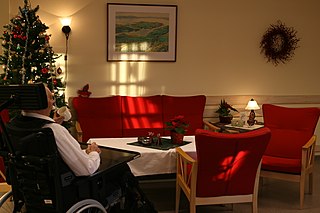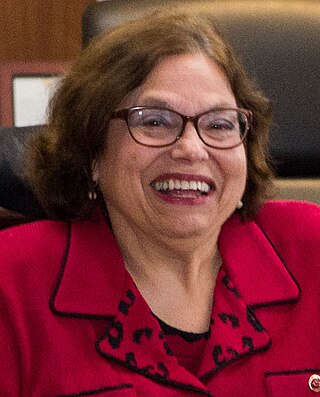Related Research Articles

The Americans with Disabilities Act of 1990 or ADA is a civil rights law that prohibits discrimination based on disability. It affords similar protections against discrimination to Americans with disabilities as the Civil Rights Act of 1964, which made discrimination based on race, religion, sex, national origin, and other characteristics illegal, and later sexual orientation and gender identity. In addition, unlike the Civil Rights Act, the ADA also requires covered employers to provide reasonable accommodations to employees with disabilities, and imposes accessibility requirements on public accommodations.

Accessibility is the design of products, devices, services, vehicles, or environments so as to be usable by people with disabilities. The concept of accessible design and practice of accessible development ensures both "direct access" and "indirect access" meaning compatibility with a person's assistive technology.

The disability rights movement is a global social movement that seeks to secure equal opportunities and equal rights for all people with disabilities.
Independent living (IL), as seen by its advocates, is a philosophy, a way of looking at society and disability, and a worldwide movement of disabled people working for equal opportunities, self-determination, and self-respect. In the context of eldercare, independent living is seen as a step in the continuum of care, with assisted living being the next step.
Edward Verne Roberts was an American activist. He was the first wheelchair user to attend the University of California, Berkeley. He was a pioneering leader of the disability rights movement.

The Rehabilitation Act of 1973 is a United States federal law, codified at 29 U.S.C. § 701 et seq. The principal sponsor of the bill was Rep. John Brademas (D-IN-3). The Rehabilitation Act of 1973 replaces preexisting laws to extend and revise the authorization of grants to States for vocational rehabilitation services, with special emphasis on services to those with the most severe disabilities, to expand special Federal responsibilities and research and training programs with respect to individuals with disabilities, to establish special responsibilities in the Secretary of Health, Education, and Welfare for coordination of all programs with respect to individuals with disabilities within the Department of Health, Education, and Welfare, and for other purposes.

Long-term care (LTC) is a variety of services which help meet both the medical and non-medical needs of people with a chronic illness or disability who cannot care for themselves for long periods. Long-term care is focused on individualized and coordinated services that promote independence, maximize patients' quality of life, and meet patients' needs over a period of time.
Frederick A. Fay was an early leader in the disability rights movement in the United States. Through a combination of direct advocacy, grassroots organizing among the various disability rights communities, building cross-disability coalitions between disparate disability organizations, and using technology to connect otherwise isolated disability constituencies, Fay worked diligently to raise awareness and pass legislation advancing civil rights and independent living opportunities for people with disabilities across the United States. He won the 1997 Henry B. Betts Award for outstanding achievement in civil rights for Americans with disabilities. Fay was recognized for "flat-out advocacy" over several decades. He helped lead the nationwide efforts by disability advocates to secure passage of the Americans with Disabilities Act of 1990.

Rehabilitation International is an international disability rights organization with member organizations in every region of the world. The RI secretariat is located in New York City.

Judith Ellen "Judy" Heumann is an American disability rights activist. She is recognized internationally as a leader in the disability community. Heumann is a lifelong civil rights advocate for people with disabilities. Her work with governments and non governmental organizations (NGOs), non-profits, and various other disability interest groups, has produced significant contributions since the 1970s to the development of human rights legislation and policies benefiting children and adults with disabilities. Through her work in the World Bank and the State Department, Heumann led the mainstreaming of disability rights into international development. Her contributions extended the international reach of the independent living movement.

The Philippines' National Council on Disability Affairs (NCDA) is the national government agency mandated to formulate policies and coordinate the activities of all agencies, whether public or private, concerning disability issues and concerns. As such, the NCWDP is the lead agency tasked to steer the course of program development for persons with disabilities and the delivery of services to the sector.
Section 504 of the Rehabilitation Act of 1973, is American legislation that guarantees certain rights to people with disabilities. It was one of the first U.S. federal civil rights laws offering protection for people with disabilities. It set precedents for subsequent legislation for people with disabilities, including the Virginians with Disabilities Act in 1985 and the Americans with Disabilities Act in 1990.

The ADA Amendments Act of 2008 is an Act of Congress, effective January 1, 2009, that amended the Americans with Disabilities Act of 1990 (ADA) and other disability nondiscrimination laws at the Federal level of the United States.
Ari Daniel Ne'eman is an American disability rights activist and researcher who co-founded the Autistic Self Advocacy Network in 2006. On December 16, 2009, President Barack Obama announced that Ne'eman would be appointed to the National Council on Disability. After an anonymous hold was lifted, Ne'eman was unanimously confirmed by the United States Senate to serve on the Council on June 22, 2010. He chaired the council's Policy & Program Evaluation Committee. Ne'eman has a diagnosis of Asperger syndrome, which made him the first autistic person to serve on the council. In 2015, Ne'eman left the National Council on Disability at the end of his second term. He currently serves as a consultant to the American Civil Liberties Union. As of 2019, he also is a Ph.D. candidate in Health Policy at Harvard University.

Vocational rehabilitation, also abbreviated VR or voc rehab, is a process which enables persons with functional, psychological, developmental, cognitive, and emotional disabilities, impairments or health disabilities to overcome barriers to accessing, maintaining, or returning to employment or other useful occupation.
This disability rights timeline lists events relating to the civil rights of people with disabilities in the United States of America, including court decisions, the passage of legislation, activists' actions, significant abuses of people with disabilities, and the founding of various organizations. Although the disability rights movement itself began in the 1960s, advocacy for the rights of people with disabilities started much earlier and continues to the present.
Community integration, while diversely defined, is a term encompassing the full participation of all people in community life. It has specifically referred to the integration of people with disabilities into US society from the local to the national level, and for decades was a defining agenda in countries such as Great Britain. Throughout recent decades, community integration programs have been increasingly effective in improving healthcare access for people with disabilities. They have been valued for providing a "voice for the voiceless"
Gunnar Dybwad (1909–2001) was an American professor and advocate for the rights of people with disabilities, particularly developmental disabilities. He is best known for his support for the social model of disability, reframing disability accommodations as a matter of civil rights, not medical treatment. The American Association on Intellectual and Developmental Disabilities gives out the Dybwad Humanitarian Award annually in his honor.

Diane Kingston, is a human rights defender and international development specialist. She is the Global Technical Lead for Disability Inclusion and Mainstreaming at Sightsavers
References
- ↑ "Disability Rights Leaders". Regional Oral History Project. Bancroft Library UC Berkeley. September 2001. Retrieved September 9, 2015.
- ↑ "Articles of Incorporation for The Northeast Independent Living Program, Inc". Secretary of State filings.
- ↑ "Access Living History of IL". The History of the Independent Living Movement. Access Living, Inc.
- ↑ "Our History — Disability Policy Consortium". History of the Disability Policy Consortium.
- ↑ "Massachusetts Rehabilitation Commission Annual Report 2007". Mass.gov/MRC. Massachusetts Rehabilitation Commission.